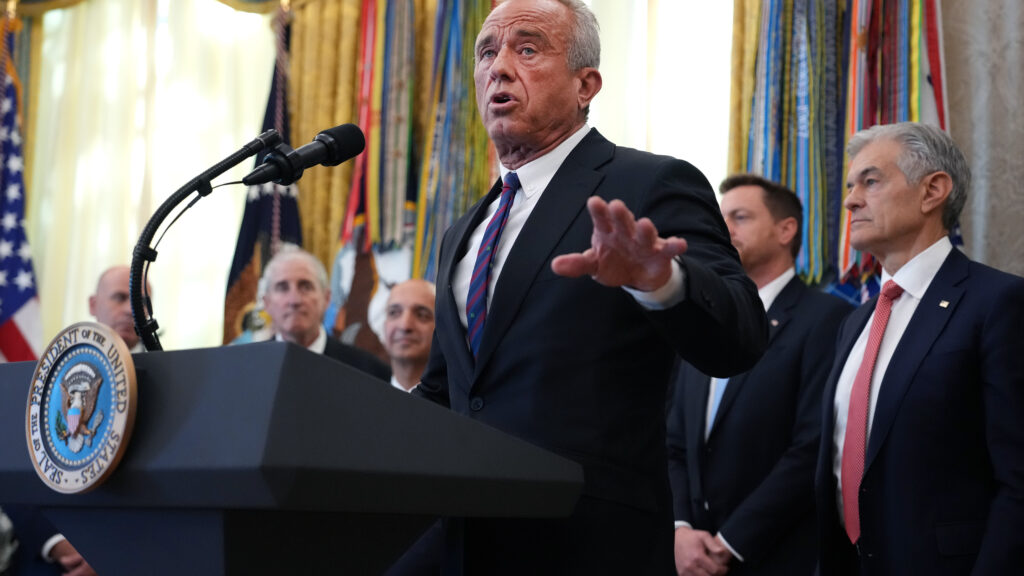Business
Kennedy Backs Trump’s Plan to Lower Obesity Drug Prices

The Trump administration’s initiative to reduce the costs of obesity medications received unexpected support from Health Secretary Robert F. Kennedy Jr. during an event at the White House on March 14, 2024. Known for his critical stance toward pharmaceutical companies, Kennedy praised the administration’s plan to enhance access to popular weight loss drugs produced by Eli Lilly and Novo Nordisk, particularly for Medicare and Medicaid patients.
In a departure from his previous criticism of the pharmaceutical industry, Kennedy described the deal as a “momentous accomplishment.” Standing alongside the CEOs of the two pharmaceutical giants, he acknowledged the importance of making these medications more accessible to those in need. “This is a tool in the toolkit,” he stated in the Oval Office, emphasizing that while the plan is significant, it is not a comprehensive solution. “It is not a silver bullet. It is an arrow in our quiver.”
Shift in Tone Reflects Broader Strategy
This marked a notable shift in Kennedy’s rhetoric, particularly as his lifestyle-focused movement, “Make America Healthy Again,” has historically opposed the inclusion of GLP-1 weight loss drugs under Medicare coverage. These medications have gained popularity due to their effectiveness in aiding weight loss among patients. Kennedy’s recent comments suggest a strategic pivot, aligning his health initiatives with a broader governmental effort to combat obesity.
The Trump administration aims to address the growing obesity epidemic, which affects millions of Americans. By facilitating access to these medications, the initiative seeks to alleviate the financial burden on patients who have previously faced high out-of-pocket expenses for obesity treatments.
Implications for Patients and the Healthcare System
The focus on expanding access to obesity drugs has significant implications for healthcare in the United States. The administration’s plan includes provisions that would allow Medicare and Medicaid to cover these medications, thus potentially increasing the number of patients who can afford them. This accessibility is crucial, as obesity is linked to numerous health complications, including diabetes, heart disease, and certain cancers.
The collaboration between the White House and pharmaceutical companies highlights a growing recognition of the need for comprehensive strategies to tackle health issues. By reducing drug prices, the administration hopes to promote healthier lifestyles and improve overall public health outcomes.
As the initiative unfolds, it will be essential to monitor its impact on both patients and the healthcare system. The response from healthcare providers and patient advocacy groups will also play a critical role in shaping the future of obesity treatment in the U.S.
In conclusion, Kennedy’s support for the Trump administration’s plan marks a significant moment in the ongoing dialogue about obesity and healthcare in America. With the involvement of major pharmaceutical companies like Eli Lilly and Novo Nordisk, the potential for increased access to effective obesity treatments may lead to better health outcomes for millions of Americans.
-

 Top Stories1 month ago
Top Stories1 month agoRachel Campos-Duffy Exits FOX Noticias; Andrea Linares Steps In
-

 Top Stories1 week ago
Top Stories1 week agoPiper Rockelle Shatters Record with $2.3M First Day on OnlyFans
-

 Top Stories6 days ago
Top Stories6 days agoMeta’s 2026 AI Policy Sparks Outrage Over Privacy Concerns
-

 Sports5 days ago
Sports5 days agoLeon Goretzka Considers Barcelona Move as Transfer Window Approaches
-

 Top Stories1 week ago
Top Stories1 week agoUrgent Update: Denver Fire Forces Mass Evacuations, 100+ Firefighters Battling Blaze
-

 Top Stories1 week ago
Top Stories1 week agoOnlyFans Creator Lily Phillips Reconnects with Faith in Rebaptism
-

 Top Stories5 days ago
Top Stories5 days agoWarnock Joins Buddhist Monks on Urgent 2,300-Mile Peace Walk
-

 Entertainment5 days ago
Entertainment5 days agoTom Brady Signals Disinterest in Alix Earle Over Privacy Concerns
-

 Top Stories7 days ago
Top Stories7 days agoOregon Pilot and Three Niece Die in Arizona Helicopter Crash
-

 Top Stories4 days ago
Top Stories4 days agoCBS Officially Renames Yellowstone Spin-off to Marshals
-

 Health2 months ago
Health2 months agoTerry Bradshaw Updates Fans on Health After Absence from FOX NFL Sunday
-

 Sports4 days ago
Sports4 days agoSouth Carolina Faces Arkansas in Key Women’s Basketball Clash



